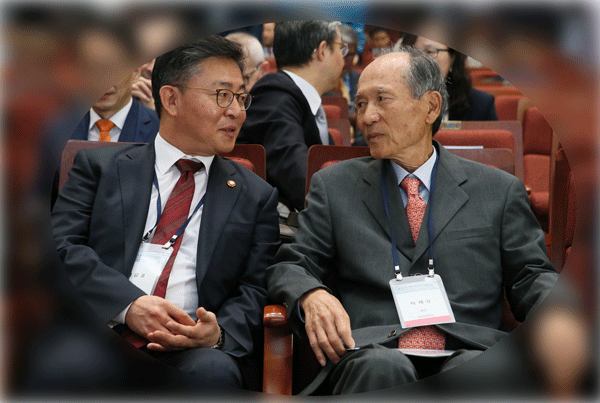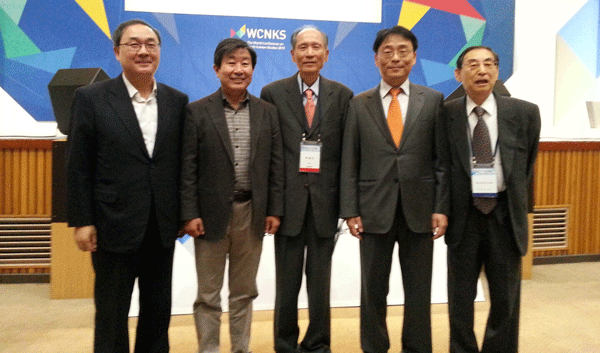Highlights of the 2nd Annual World Conference on North Korean Studies
The 2nd annual World Conference on North Korean Studies (WCNKS) was held from October 12 to 15, 2015. Hosted by the Ministry of Unification and organized by the Korean Association of North Korean Studies, the event marked the 70th anniversary of Korea’s liberation from Japan’s colonial rule and served as an occasion to assess the reality of North Korea plus discover ways to achieve peaceful Korean unification.
According to the organizers, the annual event aims to provide an opportunity for high-level exchange of knowledge and experience among eminent scholars and field experts who study North Korea and unification issues, with the goal of fostering network among them. It also aims to better establish the academic basis for Korean unification and build mutual consensus on North Korean and unification issues.

Bigger and Better
The four-day affair was held on the cozy confines of Soongsil University and included a fabulous welcoming reception, cultural performances, screening of North Korean films, stamp exhibition, cultural tour, and two solid days of expert presentations and discussions.
Building upon last year’s success, this year’s WCNKS brought together scholars and practitioners under the banner, “North Korean Studies Today, Talking about the Korean Unification.”
The conference covered the full gamut of topics--from panels on the conventional and widely traversed North Korean issues such as the country? political structure, foreign relations, economic problems, societal changes, nuclear ambitions, and human rights violations to the more nuanced, hidden, and future-oriented such as infrastructure development, tourism, health and welfare, art, national image construction, and women’s lives, among others.
The conference’s opening session featured remarks from Cho Seong-Ryoul, Chairperson of the organizing committee and President of the Korean Association of North Korean Studies; a video message from ROK President Park Geun-hye; and remarks from Unification Minister Hong Yong-pyo and Soongsil University president Hern-Soo Hahn. Capping off the session, President Park Jae Kyu of Kyungnam University engaged the audience with his keynote speech (see adjacent article).
Two expert roundtable meetings were also held to examine the various aspects of the German unification experience to draw out lessons for the Korean context, and to diagnose today’s ‘hard reality’ of North Korea and the Korean Peninsula. Participants shared and gathered wisdom with the purpose of leading us closer toward a peaceful Korean unification through a sense of community.
Honoring and celebrating the 25 years of German unification, one roundtable presented the results of the transfer project T03 “Knowledge Transfer as Intercultural Translation: Development of Exemplary Practices of Transformation preparing Activities in Korea.” The project members saw opening of North Korea toward economic, societal, and political liberalization as an important precondition for a Korean unification. Rather than reflecting on scenarios of North Korean transition, the project took a more holistic view. In light of the German experience, the project members suggested transfer of knowledge in seven specific German arenas of experience: development of labor market, entrepreneurship, the management of small and medium-sized companies, change of elites, biographical experiences of generations, psychosocial coping with system changes, and political and administrative decentralization.
Multiple Panels, Plethora of Topics
The conference featured multiple discussion panels. Those in the attendance were treated to a wide range of rich and insightful presentations. Below are highlights from a few of the panels.
In the panel ‘Political System and Power Structure in North Korea’, Patrick McEachern of the US Embassy in Tokyo discussed the continuity and change of the DPRK’s political system under the young leader Kim Jong Un. According to McEachern, Kim has “demonstrated his preference for a more traditional totalitarian ruling style in line with his Grandfather’s approach.” Pondering whether or not Kim has the personal charisma to sustain his more totalitarian ambitions, McEachern sees a regime in transition, questioned its stability, and speculated that the country? next domestic crisis could provide insight into whether the young leader will continue on his preferred path or “pivot back to his father’s modus operandi.”
In an empirical study of North Korea’s power elite, Chin Hee Gwan of Inje University pointed out the staying power of existing elites who closely accompanied Kim Jong Un during his early period but also Kim? increasing frequency of utilizing new and young competent staff. According to Chin, “there was not much change in 20 to 30 top officials mentioned on the Political Bureau at major national events such as a national meeting or Supreme People’s Assembly.” Based on his analysis, Chin sees some change at the practical level of North Korean elites, but only limited change at the level of top officials, subsequently limiting outside watchers’ ability to connect this development with regime stability or system disorder.
A panel that drew considerable pre-conference interest and a large audience was ‘Lives of North Korean Women’. Huashan Jin of the Women Research Center of Yanbian University presented her investigation on the women’s economic activities in North Korea, in particular the image of women operators. Her study also broadly touched on gender roles in DPRK society. “Irregular system for survival was tacitly permitted by the regime, and the unofficial labor market started. The female workers’ welfare system became part of the private sector, even for women working in the planned and official economic sector.” Jin recommends more intense micro-level research on the daily lives of women in order to break new ground in the field.
In a panel on ‘Infrastructure in North Korea: Toward a Unified Economy’, Rainer Dormels of the University of Vienna examined North Korea’s industrial companies in order to give empirical justification for categorizing the geographical representation of the country’s industrial regions. According to Dormels, four regions are most prominent: PyongyangNampho, Phyongnam/Anju, Hamhung, and Chonjin. Among them, largely overlooked yet second-largest is Phyongnam/Anju. In Dormels view, as the country transitions to more market activities, greater attention will need to be given to this industrial area, especially “to prevent the cities of this region from becoming ‘loser cities’” in a more competitive future economic environment.
In a highly sophisticated research presented in the same panel, Robert Winstanley-Chesters of the University of Leeds revealed the connection of national mythologies, topographies, and commemorations to the DPRK’s political narrative. Using theoretical articulations and analytic constructs, Winstanley-Chesters explored the role of water flow and hydrological engineering in the country’s development, reviewing foundational moments and more recent mega-projects and the contemporary importance of water resources to North Korea’s institutions. “Both control of hydrological resources and the ability of the state to recover new and useful land from bodies of water are framed within its politics as fundamental to the notion of building an authentically modern and revolutionary sovereign body.” According to his presentation, “Not only does this literally new landscape add to the capacity of Pyongyang’s agricultural or aquacultural sectors, it provides connections between the generations of the Kim family.”
An interesting panel on ‘North Korean Tourism and North Korean Society’ saw Dean Ouellette of Kyungnam University talk about the significant changes of the DPRK tourism sector during the era of the new leadership. Highlighting a slight shift, Ouellette spoke of developments in the industry as not only indicative of the regime’s seriousness in incorporating tourism as a part of the national economic plan but also of a type of regime compromise to the growing middle class. Spillover effects include an emergent ‘image makeover’ of the country taking place within social media on the worldwide web. “North Korea seems to see tourism as a potentially significant revenue stream -- taking advantage of the ‘rise of Chinese tourists’ -- and as an important means to counter stereotypes of the country.” In light of the growing developments, he suggests the international community seek more robust people-to-people engagement in this sector to “legitimize what is legitimate” and signal peace by helping in the country’s human resource and economic development in subtle but meaningful ways.
In a follow up presentation, Jeong Eunmee of the Institute for Peace and Unification Studies, Seoul National University, talked about the socioeconomic characteristics and life-styles of what is seen by outsiders as a “growing middle class” in North Korea. “Social differentiation and inequality is significantly underway in North Korea. Discordance between social strata measured by the objective indicators and ones classified as subjective belonging appears very clearly, especially the discordance is heavily on the middle class.” According to Jeong, “job variable is a significant one statistically of social and economic factors that determine the class position.” She highlighted the noticeable mismatch between job and income positions, that education is not a significant means of upward social mobility, and a clear gap between social tiers in consumption and information environment as well as life.

Difficult Choices and Development of the Discipline
Overall, this year’s WCNKS boasted several interesting and worthwhile panel discussions, with a commendable quality and variety of speakers. But so much variety can pose issues. “The compression of so much into two days meant that four or more events were happening at once, leading to difficult choices,” according to one foreign scholar and North Korea watcher in attendance.
With the heightened public interest, some of the panels resulted in standing-room only for the audience. “Taking into consideration the encouraging public turnout, the organizers of next year’s WCNKS may need to be attentive to technical factors like room size more closely.”
In the aggregate, outcomes were positive. “It’s great to see so many people interested in North Korean Studies,” commented one attendee. “More conferences like this would go a long way to build interest and promote the discipline.”
According to Park Jae Kyu, President of Kyungnam University, “The WCNKS is an indispensable venue for good research to be accomplished, and we should strive to find a good balance between scientific and policy researches. In addition to fostering quality scholarly outputs, I hope that the WCNKS will serve as a platform for scholarly discussion that can produce good policy suggestions to help us tackle the challenges surrounding North Korea and Korean Unification issues.”

